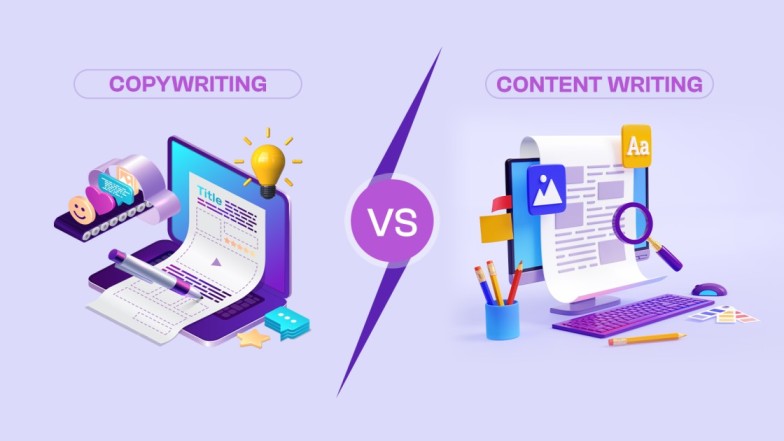
Copywriting Vs Content Writing: Importance & 7 Key Differences
The distinction between Copywriting and Content Writing holds significant implications. While both share the goal of engaging an audience, they diverge in purpose and approach.
Copywriting crafts concise, persuasive messages for ads and campaigns to drive conversions. On the other hand, Content Writing provides insights, educative content, and entertainment, catering to audience interests while reinforcing brand credibility through blogs and articles.
Both forms contribute distinctively to the dynamic landscape of communication strategies, with Copywriting vs Content Writing as two pillars that collectively shape brand resonance, audience engagement, and successful communication outcomes.
The Main Difference Between Copy And Content
The key difference between content and copy lies in their purpose and intent. Content is informational and aims to educate, entertain, or inform the audience while providing value. It focuses on delivering valuable insights and building a relationship with the reader. On the other hand, a copy is persuasive and aims to prompt a specific action, such as making a purchase or signing up. It employs strategic language, storytelling, and psychological triggers to influence the reader’s decision. Content is about building a connection, while copy is about driving conversions and achieving a specific goal in marketing and communication.
What Is Content Writing?

Content writing applies to creating written material for various platforms such as websites, blogs, social media, etc. It aims to inform, entertain, or engage a specific audience. Content writers develop articles, blog posts, product descriptions, social media posts, and other text-based content that resonates with readers, conveys information effectively, and aligns with the brand’s voice. The goal is to provide value to the audience, drive engagement, and often support marketing objectives. Effective content writing requires a clear understanding of the subject matter audience and the ability to craft compelling and well-structured text.
Types Of Content Writing
- Blog Posts: Blogging involves creating informative, engaging, and often opinionated articles on specific topics. These posts can vary in length and style, catering to various interests and audiences.
- Web Content: This includes creating content for websites such as homepage copy, about pages, product or service descriptions, and landing pages. The goal is to present information clearly and compellingly to attract and inform visitors.
- SEO Content: Search Engine Optimization (SEO) content focuses on incorporating relevant keywords and phrases to improve a website’s visibility on search engines.
- Social Media Content: Social media content involves creating short, engaging text snippets for platforms like Facebook, Twitter, Instagram, and LinkedIn.
- Copywriting: Copywriting is persuasive writing designed to prompt action, such as buying a product, signing up for a newsletter, or clicking a link.
- Technical Writing: Technical writing involves creating clear and concise instructions, manuals, guides, or documentation for complex topics or products.
- Academic Writing: Academic content includes research papers, essays, dissertations, and scholarly articles. It requires a formal tone, adherence to citation styles, and a deep understanding of the subject matter.
- Press Releases: Press releases are written to announce newsworthy events, product launches, or developments within a company.
- Whitepapers: Whitepapers are in-depth documents that explore a specific problem, topic, or technology. They often present research findings, analyses, and solutions comprehensively.
- Creative Writing: This type includes fiction, poetry, and creative non-fiction. It’s focused on artistic expression and storytelling rather than conveying information.
- Ebooks: Ebooks are longer-form content pieces, often used for educational purposes. They can range from instructional guides to comprehensive resources on a particular subject.
- Video Scripts: Writing scripts for videos, such as YouTube videos, tutorials, or promotional videos, requires clear and engaging writing that can be easily translated into spoken word.
- Email Marketing Content: This involves crafting emails that effectively communicate subscribers’ messages, offers, or updates.
What Is Copywriting?

Copywriting is crafting persuasive and compelling written content to drive a specific action from the reader, such as purchasing, signing up for a service, or clicking a link. Copywriters use strategic language, storytelling, and psychology to captivate the audience and influence their decisions. It’s commonly used in advertisements, marketing campaigns, emails, sales pages, and more. Copywriting aims to create messages that resonate with the target audience, highlight a product’s or service’s benefits, and ultimately lead to conversions and desired outcomes.
Types Of Copywriting
- Direct Response Copywriting: This type of copywriting is designed to elicit an immediate response from the audience, usually through a purchase, subscription, or inquiry. It often employs strong calls to action and focuses on the product or service’s benefits.
- Advertising Copywriting: Advertising copy is found in traditional media like print, radio, and television, as well as online banners and display ads. It aims to capture attention quickly and communicate a compelling message in a limited space.
- SEO Copywriting: SEO copywriting involves creating engaging content optimized for search engines. It incorporates relevant keywords and phrases to improve a website’s search engine ranking.
- Social Media Copywriting: Copy for social media platforms requires concise, attention-grabbing language that fits within character limits. It encourages interactions, shares, and clicks while aligning with the platform’s tone and audience.
- Email Copywriting: Writing effective email campaigns involves crafting subject lines and content that entice recipients to open and engage with the email. It often combines storytelling, persuasive language, and clear calls to action.
- Landing Page Copywriting: Landing page copy is tailored to a specific offer or product and is meant to convert visitors into customers. It highlights the unique value proposition and guides the reader towards a conversion.
- Sales Page Copywriting: Sales pages provide in-depth information about a product or service and address potential objections. They use persuasive techniques to convince readers of the product’s benefits and value.
- Catalog and Product Description Copywriting: In e-commerce, compelling product descriptions showcase the features, benefits, and unique qualities of each item. They help customers make informed purchase decisions.
- Content Marketing Copywriting: Content marketing involves creating valuable content (blogs, articles, guides) that informs, educates, or entertains the audience while subtly promoting a brand or product.
- Video Script Copywriting: Writing scripts for video content, such as commercials, explainer videos, or webinars, requires succinct and engaging language that complements the visual elements.
- Public Relations (PR) Copywriting: PR copywriting involves crafting press releases, media pitches, and statements communicating newsworthy events or developments about a company or product.
- Non-Profit Copywriting: Non-profit organizations use copywriting to convey their mission impact and call for donations or support, often appealing to emotions and values.
7 Key Differences Between Copywriting Vs Content Writing

1. Content Writers Often Explore Diverse Topics, While Copywriters Align With Marketing Objectives.
Content writers and copywriters have distinct focuses in their writing endeavors. Content writers are known for their versatility, delving into various topics to educate, entertain, and engage readers. They create informative and insightful pieces that cater to diverse interests, building a brand’s authority and attracting a broad audience.
On the other hand, copywriters closely align their craft with marketing objectives. They craft compelling messages that resonate with specific target audiences and prompt immediate actions, such as purchasing or signing up. Their language is strategic, aiming to elicit emotional responses and create a sense of urgency. Copywriters drive conversions through concise, persuasive content that supports the brand’s sales and marketing efforts.
While content writers foster a holistic relationship with readers, enriching their understanding, copywriters skillfully manipulate language to trigger desired behaviors and achieve tangible outcomes in alignment with the business goals.
2. Content Writers Prioritize SEO, While Copywriters Might Not.
Content writers and copywriters have varying priorities regarding search engine optimization (SEO). Content writers prioritize SEO by incorporating relevant keywords, optimizing meta tags, and ensuring their content ranks well on search engines. This approach aims to increase organic visibility and attract a broader audience.
Copywriters might not always focus on SEO as their primary concern. While they still need to consider SEO to some extent, their main focus is crafting persuasive and compelling messages that drive specific actions. Their language is often designed to resonate with emotions and prompt immediate responses, which might only sometimes align perfectly with traditional SEO strategies.
Overall, while content writers and copywriters may consider SEO, content writers typically place more emphasis on it due to the nature of their content’s long-term visibility and reach, while copywriters concentrate on creating persuasive content that converts.
3. Copywriters Drive Conversions, While Content Writers Nurture Engagement And Trust.
Copywriters and content writers play distinct roles in the realm of writing. Copywriters are primarily responsible for creating persuasive and compelling content that drives conversions, encouraging readers to take specific actions such as purchasing or signing up for a service. Their language is geared towards triggering immediate responses and maximizing sales.
In contrast, content writers focus on building engagement and trust with the audience. Through informative, educational, and entertaining content, they aim to establish the brand as a reliable source of information. While they may not have the primary goal of immediate conversions, their efforts contribute to a loyal and informed readership, ultimately enhancing the brand’s reputation and authority.
Copywriters and content writers form a symbiotic relationship within a comprehensive marketing strategy, with copywriters aiming for immediate impact and content writers nurturing a lasting connection with the audience.
4. Copywriters Focus On Triggering Actions, While Content Writers Build Connections.
Copywriters craft persuasive messages that prompt specific actions, such as purchases or sign-ups, utilizing strategic language and emotional appeals to drive immediate results. Their primary goal is to encourage conversions and fulfill marketing objectives.
On the other hand, content writers excel in creating valuable, informative, and engaging content that builds connections with the audience. They focus on fostering trust, establishing the brand as an authoritative source, and nurturing a long-term relationship with readers. While conversions might not be their main priority, their work contributes to brand loyalty and sustained engagement.
Copywriters thrive on driving short-term actions, while content writers invest in cultivating lasting relationships that extend beyond immediate transactions. Both roles are essential to an effective content strategy, catering to different customer journey stages and overall marketing goals.
5. Copywriting Emphasizes Compelling Ctas, Whereas Content Writing’s Ctas Are Less Urgent.
Copywriting strongly emphasizes creating compelling Calls to Action (CTAs) that urge immediate action, using persuasive language and a sense of urgency to drive conversions. The primary aim is to prompt readers to take specific steps promptly.
Conversely, content writing’s CTAs are often less urgent and focus more on encouraging readers to explore, engage with the content, or subscribe for future updates. These CTAs are designed to build a sense of interest and trust over time rather than driving immediate transactions.
While both copywriting and content writing employ CTAs to guide reader behavior, the urgency and tone of these CTAs differ, aligning with the respective goals of driving immediate actions in copywriting and nurturing a lasting connection in content writing.
6. Copywriting Persuades Sales, While Content Writing Imparts Information.
Copywriting is geared towards persuading the audience to purchase or take specific actions, utilizing persuasive techniques, emotional triggers, and a strong call to action to drive sales and conversions.
On the other hand, content writing focuses on imparting valuable information, educating, entertaining, and engaging the audience. Content writers aim to provide insights, answers, and entertainment that resonate with readers and build a loyal readership.
While both copywriting and content writing contribute to a comprehensive marketing strategy, copywriting’s core objective is to encourage immediate transactions, while content writing aims to establish trust, expertise, and a deeper connection with the audience through informative and engaging content.
7. Copywriting Thrives On Concise And Impactful Messaging, And Content Writing Is More Expensive.
Copywriting delivers concise and impactful messages, using carefully chosen words and persuasive techniques to drive specific actions. The focus is on brevity, clarity, and urgency to capture attention and prompt conversions.
In contrast, content writing takes a more expansive approach, allowing for in-depth exploration of topics. Content writers can delve into details, provide comprehensive information, and engage readers with longer-form content, fostering a deeper understanding and connection.
While both copywriting and content writing serve distinct purposes, with copywriting aiming for quick actions and content writing aiming for engagement and education, their approaches to messaging reflect their respective goals and strategies.
Can A Professional Content Writer Perform Copywriting?
Yes, a professional content writer can transition into copywriting, but certain additional skills and adaptations are required. Both roles involve writing, but copywriting demands a more persuasive and action-driven approach. A content writer should develop skills in creating compelling calls to action, understanding consumer psychology, and crafting succinct yet impactful messaging.
While content writing focuses on providing valuable information, copywriting demands a deep understanding of marketing strategies, target audience analysis, and the ability to drive conversions through persuasive language. Content writers should learn to adapt their style to prompt specific actions, evoke emotions, and create a sense of urgency. By honing these skills, content writers can effectively bridge the gap between informative content and persuasive copy, expanding their versatility and contribution in various marketing contexts.
How To Get A Great Content or Copy?
Creating great content or copy is essential for effectively communicating with your audience and achieving your goals, whether it’s to inform, engage, persuade, or drive conversions. Here are some key steps to help you craft outstanding content or copy:
- Understand Your Audience: Know your target audience’s preferences, needs, pain points, and interests. Tailor your content or copy to resonate with them.
- Define Your Purpose: Determine the purpose of your content or copy. Are you aiming to educate, entertain, sell, inform, or inspire? Clarifying your goal will guide your writing.
- Research Thoroughly: Gather accurate and relevant information about your topic. For content writing, this ensures credibility, and for copywriting, it helps you understand the product or service you’re promoting.
- Create a Compelling Hook: Start with an attention-grabbing headline or opening that piques curiosity or addresses a problem your audience faces.
- Craft a Clear Structure: Organize your content or copy logically. Use subheadings, bullet points, and paragraphs to make it easy to read and understand.
- Use Persuasive Language (Copywriting): In copywriting, employ persuasive techniques such as emotional appeals, social proof, scarcity, and urgency to encourage action. Highlight benefits and unique selling points.
- Provide Value (Content Writing): In content writing, focus on delivering valuable information, insights, or entertainment. Your content should solve problems, answer questions, or offer fresh perspectives.
- Keep it Concise (Copywriting): Be succinct while conveying your message. Use short sentences and impactful words to maintain the reader’s attention.
- Engage Through Storytelling: Incorporate storytelling elements to make your content relatable and memorable. Stories evoke emotions and create a deeper connection.
- Incorporate Visuals: Use relevant images, infographics, or videos to complement your content or copy. Visuals can enhance understanding and engagement.
- Maintain Brand Voice: Whether you’re writing content or copy, ensure your tone and style align with your brand’s voice. Consistency fosters recognition and trust.
- Edit and Proofread: Thoroughly edit your work for clarity, grammar, punctuation, and style. Errors can undermine your credibility and message.
- Test and Iterate (Copywriting): In copywriting, test different variations of your copy to see which resonates best with your audience. Analyze the results and make improvements.
- Include a Strong CTA (Copywriting): End your copy with a clear and compelling call to action. Make it easy for readers to take the desired step.
- Encourage Engagement (Content Writing): In content writing, invite readers to leave comments, share their thoughts, or ask questions. Engaging with your audience builds community.
- Optimize for SEO (Content Writing): If your content is online, use relevant keywords and phrases to improve its search engine visibility—balance SEO with natural, readable content.
- Seek Feedback: Get feedback from colleagues, peers, or beta readers to gain fresh perspectives and improve your content or copy.
- Stay Updated: Keep up with industry trends, audience preferences, and changing communication styles to ensure your content or copy remains relevant.
Copywriting Vs Content Writing: Which Is More Effective In Digital Marketing?

Both copywriting and content writing play pivotal roles in digital marketing, each offering distinct advantages depending on the marketing objectives and target audience.
Copywriting is highly effective for specific, immediate actions such as driving sales, sign-ups, or clicks. Its persuasive language, emotional appeals, and clear calls to action (CTAs) are designed to capture attention and encourage conversions swiftly. In digital marketing, copywriting thrives in ad campaigns, landing pages, and email marketing, where concise yet compelling messaging can quickly lead to desired outcomes.
On the other hand, content writing excels in building a long-term rapport with the audience. High-quality content provides value, educates, and establishes the brand as an authoritative source. It nurtures engagement, fosters trust and encourages social sharing. Content writing contributes to organic search visibility and boosts SEO efforts, as search engines reward well-researched and valuable content. Blogs, articles, and informative web content are essential for inbound marketing strategies, attracting organic traffic, and forming lasting connections.
The choice between copywriting and content writing depends on the marketing goals. For immediate conversions and targeted actions, copywriting is ideal. However, content writing is more effective for creating a robust online presence, engaging with a wider audience, and establishing brand credibility. In many cases, a balanced approach that utilizes both styles can maximize the benefits of each, ensuring a well-rounded digital marketing strategy that captures attention, drives actions, and builds sustained engagement.
Frequently Asked Questions
What Is The Main Difference Between Copywriting Vs Content Writing?
Copywriting creates persuasive and action-driven content to drive specific actions, such as purchasing or signing up. Content writing, on the other hand, aims to provide informative, educational, or entertaining material that engages the audience without a primary focus on immediate conversions.
Which One Is More Sales-Oriented?
Copywriting is more sales-oriented. Copywriters use persuasive language, emotional appeals, and calls to action to encourage readers to take immediate actions, leading to sales or conversions. While indirectly contributing to sales, content writing prioritizes building trust and engagement with the audience.
What Is The Role Of Emotion In These Writing Styles?
Emotion plays a significant role in both styles, but it’s more prominent in copywriting. Copywriters aim to evoke emotions that drive quick decisions, while content writers use emotion to engage and connect with readers, often through storytelling.
How Does The Target Audience Influence The Writing Style?
The target audience strongly influences both styles. Copywriters tailor their language and messaging to appeal to their target audience’s specific desires and pain points. Content writers adapt their tone and style based on the audience’s preferences, ensuring the content is relatable and engaging.
Which Style Is More SEO-Focused?
Content writing is generally more SEO-focused. Content writers aim to incorporate relevant keywords and optimize their content to rank well on search engines. While copywriters consider SEO to some extent, their main focus is often on persuasive language and immediate impact.
What’s The Ultimate Goal Of Each Writing Style?
The ultimate goal of copywriting is to drive conversions and achieve specific actions, such as sales or sign-ups. Copywriters measure success by the immediate impact of their content on the bottom line. Content writing aims to provide value, establish authority, and build a loyal audience.
Copywriting Vs Content Writing: Which Is The Best Career?
Both copywriting and content writing can be excellent career options, but the choice depends on your preferences, skills, and career goals.
Copywriting can be rewarding, especially for those who excel at persuasive language and enjoy crafting messages that drive specific actions. It offers the potential for higher earnings due to its direct impact on sales and conversions. However, it comes with the pressure of meeting conversion targets and continuously adapting to marketing trends. The median annual income for copywriters in the US is around $69,000, with potential earnings varying based on experience.
Content writing, on the other hand, is a great fit for individuals who have a talent for creating engaging, informative, and entertaining material across various platforms. It allows for more creative freedom and versatility in topics. While the income potential might be slightly lower than copywriting, content writers can still earn a comfortable living. The median annual income for content writers in the US is approximately $64,000, and the role offers a broader range of writing opportunities.
Ultimately, the best career choice depends on your strengths, interests, and how you want to contribute to the writing world. Copywriting might be for you if you thrive on persuasion and concise messaging. Content writing could be better if you enjoy storytelling, education, and a diverse writing landscape.
Read More Popular Posts:

















































